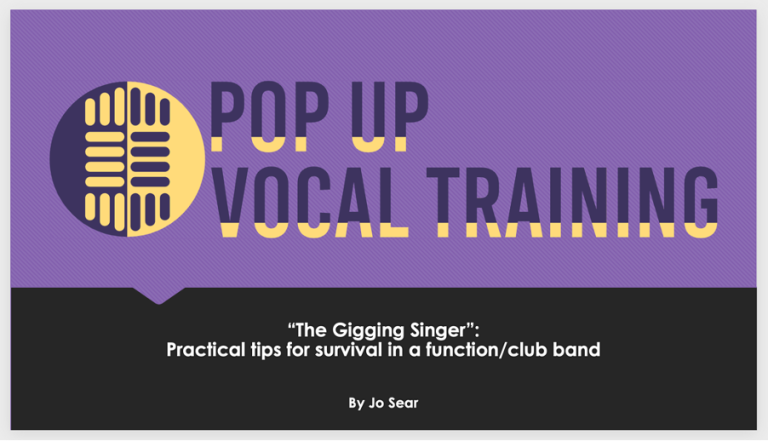About Jo
Jo has been performing professionally, primarily as a ‘gigging singer’, for nearly 30 years. Raised on a diet of awesome rock, pop and soul music (thanks, Mum and Dad), she joined her first working band at age 21 and has been behind a microphone ever since, singing lead and backing vocals in a wide variety of rock, soul and blues bands, working as a session singer and taking part in many stage productions, including several at the London Palladium. She is currently lead singer of The Soul Enforcement Bureau, an 8-piece soul band.
Jo is a skilled session vocalist who specialises in vocal harmony arranging and multi-tracking. She has developed a reputation as a ‘super-dep’ for many professional bands due to her ability to step in and cover vocals, often at short notice.
Voice training
Jo recently achieved a Distinction for her voice pedagogy Masters degree, which she completed via Voice Study Centre (www.voicestudycentre.com) and the University of Wales, Trinity St. David. Popular Music voice pedagogy is her specialist research area. She has now been accepted to study towards a PhD at the prestigious Royal Northern College of Music in Manchester, starting September 2023.
Jo’s vocal training journey in Popular Music began with specialist rock and pop coaching from Stevie Vann Lange. Following this, Jo began studying Estill Voice Training, completing two full Level 1 and Level 2 courses in 2007 and 2016 under the tutelage of the RAM’s Anne-Marie Speed and Paul Farrington (www.estillvoice.com) and attending many other EVTS day courses.
These gave her the grounding in voice physiology and technique needed to pursue further study at Masters Degree level. Jo is a huge believer in the fact that learning is a continuous process that never ends. She regularly attends voice training short courses in a variety of subjects, with recent courses having included:
- “Beyond the Major Scale”: Engaging the ear and voice in vocal exercises with Kim Chandler (Voice Study Centre)
- ‘The integration of a science-informed approach to the application of teaching singing’ – Dr. Kari Ragan (Voice Study Centre)
- Introduction to Voice Acoustics – Dr. David Howard and Dr. Jenevora Williams (Evolving Voice)
- Voice Acoustics and Kinaesthetic Pedagogy – Prof. Kenneth Bozeman (Voice Study Centre)
Popular Music Pedagogy: Jo’s ‘Life’s Work’
“‘Pop-Up’ was created for a very important reason: To promote the value of popular music voice training and elevate its educational status in the UK.
As a Popular Music singer all my life, I am a passionate (occasionally fiery) advocate of the importance of training more rock/pop teachers and conducting more contemporary voice research. Rock, pop and soul singing is no longer an ‘outlier’ in the UK music industry: it is its beating heart.
If Popular Music is the now the dominant cultural force, where are its training programmes in comparison with Classical Music?
Modern statistics show the domination of Popular Music in both streamed and purchased music charts, and the enormous value of the UK music industry as an economic export is well-recognised.
So, if Popular Music is the now the dominant cultural force, where are its training programmes in comparison with Classical Music? Where and how are PM singers getting their voice training, and how much of what is being taught is current or relevant?
As a strong promoter of the value of pop, rock and soul singing, and the need for much more research in this historically neglected area, I have spent the last few years pursuing a number of different academic studies as part of my MA in Vocal Pedagogy, including:
- The training of upper register for male CCM singers aged 16 and above
- Commonalities found within PM literature
- The creation of a prospective curriculum for training pop, rock and soul singers and singing teachers
The latter study – my final MA dissertation project – was based on extensive literature research and was assessed by industry professionals from UK Popular Music educational institutions such as ACM, BIMM and ICMP. This work has now been published in the Journal of Popular Music Education (see News!) and I plan to continue developing this curricular framework as part of my upcoming PhD at RNCM.
I always joke that PM voice pedagogy is the ‘drum I’ll beat until I die’ but honestly, I’m proud that this is going to be my life’s work.” JS x










